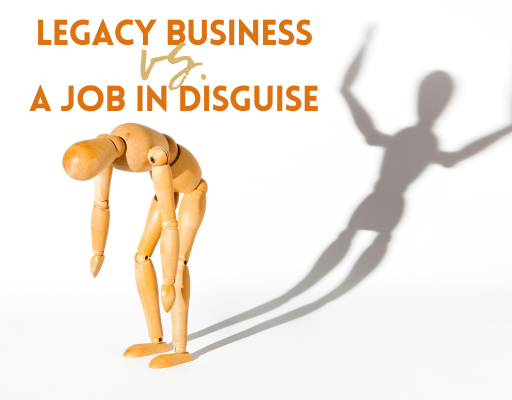Starting a business is a monumental achievement, but not all businesses are created equal. Some are designed to last for generations, while others are merely a reflection of the owner’s skills and efforts, often referred to as a “job in disguise.” In this article, we will explore the key differences between a legacy business and a business that is highly dependent on the owner. We’ll discuss how a legacy business can be passed down to future generations, and why both models have their merits.

Legacy Business: Building for Generations
A legacy business is one that is built to endure the test of time. It is not solely dependent on the skills and efforts of the owner but has systems, processes, and value that can be transferred to the next generation or a third party. Here’s how you can tell if a business falls into the legacy category:
- Scalability: A legacy business is scalable. It has the potential to grow and expand beyond the
capabilities of its current owner. This scalability is often achieved through the development of
standardized processes and clear organizational structures. - Diversified Revenue Streams: Legacy businesses often have multiple revenue streams. They are
not reliant on a single product or service but have adapted to changing market conditions by offering a range of products or services. - Brand and Reputation: Legacy businesses have a strong brand and reputation in their industry. They have built trust and loyalty with customers over time, which contributes to their long-term success.
- Succession Planning: A key characteristic of a legacy business is the presence of a well-thought-out succession plan. This plan outlines how the business will be passed down to the next generation or successor owner, ensuring continuity.
- Documentation and Procedures: Legacy businesses prioritize documentation and standardized
procedures. This makes it easier to train new employees and ensures consistency in operations. - Long-Term Vision: The owner of a legacy business often has a long-term vision beyond their own
tenure. They are committed to seeing the business thrive even after they step down.
Examples of legacy businesses include well-established family-owned companies like Ford, Johnson & Johnson, and Rolex, which have successfully passed down their businesses through generations.
A Business in Disguise: Owner-Centric Businesses
On the other hand, some businesses are essentially a “job in disguise.” These businesses are highly dependent on the owner’s skills, expertise, and personal reputation. Here’s how to identify such businesses:
- Owner-Centric Operations: The success of the business is largely dependent on the owner’s personal involvement. For instance, professional practices like law firms, medical practices, or consultancy firms often fall into this category if there is just one licensed professional and the business would shut down at their death.
- Limited Scalability: Owner-centric businesses have limited scalability. Growth is often constrained by the owner’s capacity to take on more work or clients.
- Personal Branding: The owner’s personal brand plays a significant role in attracting clients or
customers. Clients choose to work with the business because of the owner’s reputation. - Lack of Succession Planning: Unlike legacy businesses, owner-centric businesses often lack a
clear succession plan. They may struggle to transition when the owner decides to retire or step back. A good owner of an owner centric business will have plans in place to close the business smoothly in the event that the owner is no longer able to do so. - Informal Processes: Documentation and standardized procedures may be lacking or minimal, as much of the business relies on the owner’s tacit knowledge. It may be unnecessary to document each aspect of the day to day, as no one but the owner would need the information.

Both Models Have Merits
It’s essential to understand that both legacy businesses and owner-centric businesses have their merits and can be successful in their own right.
Legacy businesses offer stability, long-term growth, and the potential for generational wealth. They can provide financial security and a lasting legacy for the family.
Owner-centric businesses, on the other hand, provide opportunities for entrepreneurs to capitalize on their expertise and build a successful career. These businesses can be highly profitable, and the owner can maintain a high degree of control.
In the next article, we will delve into the specific strategies for preparing for each type of business model. Whether you aspire to build a legacy business that can be passed down through generations or you are content with an owner-centric business that revolves around your skills and expertise, there are steps you can take to ensure your business is a long-term success.
Understanding the difference between a legacy business and a business that is a job in disguise is crucial for aspiring entrepreneurs and existing business owners. Each model comes with its own set of challenges and advantages. By identifying which category your business falls into, you can make informed decisions about its future and take the necessary steps to ensure its success, whether that means building a legacy that will endure for generations or optimizing your owner-centric business for maximum profitability. Check out our next article, where we will explore specific strategies for preparing for each type of business model.








